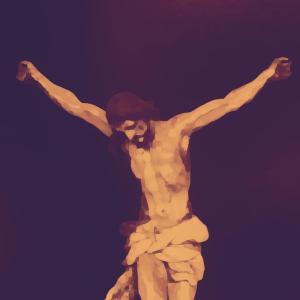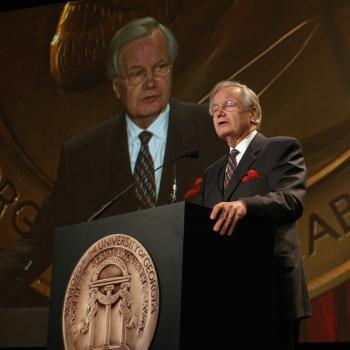
Spring has been deceptive this year with warm weather coming and going, teasing us along, and all the while the calendar telling us that it’s still winter. And Lent has begun. It’s appropriately timed for another ritual of spring — spring cleaning. For Christians who observe the Lenten season, it also means spring cleaning of the soul.
It’s a time when we wipe away every bit of dust in our homes, metaphorically speaking, wash the curtains and rugs, take down the drapes for dry cleaning, scrub the windows inside and out, and deep-clean the carpets. It means emptying the closets and deciding which items to keep, which ones to toss and which ones to donate. So it is with Lent.
Stumbling Through Lent
My introduction to the Lenten season came when I joined the Methodist church during college. I grew up Baptist and never heard Lent mentioned. Most of my friends prior to college were also Baptist and didn’t know anything about Lent, either. It was something that never entered our hearts or minds.
I joined the Methodist church through the Methodist student union on campus, and it didn’t offer confirmation classes. The other regulars at the Methodist student union were cradle Methodists and knew all about Lent. I was painfully shy and didn’t want to appear ignorant. Consequently, I pretended to know all about Lent and didn’t talk to anyone about it or ask questions.
This meant I picked up snatches of information about the season here and there through the years. Methodist beliefs, as explained by various Sunday School teachers and ministers over the years, seemed to correspond with my beliefs, and that was enough given that I had struggled with highly conservative theology throughout my teen years.
What Is Lent?
Now that I have a better understanding of Lent, let me share what the United Methodist Church (UMC) says about it:
Lent is the 40-day period leading up to Easter, not counting Sundays. The 40 days remind us of the 40 days Christ prepared for the beginning of his ministry by fasting and praying in the wilderness. It was also the time when Satan tried his hardest to tempt Christ.
The word Lent comes from the Anglo-Saxon word lencten, which means lengthen as in the lengthening days of spring. “Lent is a time of repentance, fasting and preparation for Easter,” UMC says in its post, What is Lent and Why Does It Last Forty Days?
“Lent began as a period of fasting and preparation for baptism by new converts and then became a time of penance by all Christians….
“Today, Christians focus on relationship with God, growing as disciples, and extending ourselves, often choosing to give up something or to volunteer and give of ourselves for others,” the church says. Read the entire UMC article here.
A Deep Cleaning
For me, Lent is a spring cleaning of the soul in that I focus on God and talk with him about my metaphorical closets and cabinets.
Do I need to throw out excessive worrying? Yes.
Do I need to replace worry with trust in him. Yes, most definitely.
Do I need to add more prayer time to my days? That’s another yes.
Do I need to read more scripture? Yes.
By throwing out a huge amount of worry that I carry with me, I will have more time to read the Bible and pray on a daily basis.
Those changes will lift up my soul, as well as improve my physical and emotional being. And I need to get started now, not next week or next month.
I need to start praying regularly when I wake up and go to bed while continuing my ongoing conversations with God during the day.
I also need to read the Bible from cover to cover, as both of my daughters are doing. It won’t happen if I procrastinate.
How I Observe Lent
This year, my church celebrated Fat Tuesday, the Tuesday before Lent, with a pancake supper. The next day, we held a beautiful Ash Wednesday worship service that ended with the pastor drawing a cross on our foreheads with ashes.
Lenten services also lift my soul and bring me closer to God.
I look forward to Palm Sunday, which is the Sunday before Easter. It commemorates Christ’s triumphal entry into Jerusalem. Some churches begin the service with a Procession of Palms, when worshippers or the choir carry palm branches as they enter the sanctuary.
The Palm Sunday service also may recall Christ’s crucifixion and death, which I would rather not do. But it’s necessary. It’s the foundation of my Christian faith.
One of my former pastors once preached – in horrific detail – about what Christ’s beatings and crucifixion entailed….what he sacrificed for us. The people who heard the sermon probably will never forget it, which I’m certain was the pastor’s intention.
I enjoy my church’s Maundy Thursday service, which is held the Thursday before Easter. It commemorates the Last Supper and Christ’s washing of his disciples feet and ends with the stripping of the altar for Good Friday, which is the next day. (Maundy may come from the word mandarum, the Latin word for commandment.)
Good Friday is a time when Christians focus on the events leading up to and including the crucifixion.
Then comes Easter Sunday. It’s a time for a celebration that begins with a sunrise service. In my small community, this service is community-wide, but I never make it. I’m a late sleeper and am too lazy, I guess, to get up before dawn on a weekend.
I now have the excuse of having night blindness. (Actually, it’s a legitimate reason rather than an excuse. I’d be dangerous trying to drive in the dark. Also, I promised a police officer that I would never again do it after I ran a stop sign in the middle of the night. The only reason I was on the road was that one of my daughters had had surgery a few days earlier and needed me. But I digress.)
Understanding Sacrifice
For years, the only thing that came to mind when I thought about Lent was sacrifice. You sacrificed something during the 40 days of Lent and placed the money you would have spent on your vice in an offering plate.
When I was first learning about Lent, I looked to my fellow students at the Methodist student union for signs about what to do.
Some students gave up chocolate and others gave up soft drinks, which is where I started connecting Lent to sacrifice and food. I didn’t think I could give up either of those items, so I gave up green beans year after year.
There were several problems with this sacrifice, if you want to call it that. First, I hated green beans (love them now). Second, I wasn’t ready to give up anything of real value. Third, Lent was and is about much more than sacrifice.
A Time to Look Ourselves in the Eye
Patheos has some great bloggers, and I would like to close with thoughts from a few of them.
Patheos contributor Greg Richardson says, “Lent is about reflecting on what we hold onto which holds us back from becoming our truest selves. We look ourselves in the eye and recognize what we do not truly need” — thus, the idea that Lent represents spring cleaning of the soul.
Richardson is a certified spiritual life mentor, coach and monk, and he describes Lent quite well. It’s a time when “we look ourselves in the eye and recognize what we do not truly need.” You can read his entire post on Lent here.
“It is during this time we can deepen our awareness of (Christ’s) sacrifice on the Cross, as well as Jesus’ daily forgiveness of our sins and unconditional love for us,” says Matt Charbonneau, a high school religious education teacher, in his post called A Practical Guide to Lent for Beginners.
He mentions giving up coffee if you rarely or never drink it. (Reminds me of green beans for some reason.) Our personal sacrifice “should be healthy, while respecting responsibilities,” he explains.
“A student electing not to do any homework for the Lenten weeks ignores his or her academic obligations and can suffer harmful ramifications. The decision not to use any illicit drugs only during Lent, and then resume the practice afterwards, contradicts our moral duty to obey civil laws and not participate in criminal activities.” You can read his entire post here.
John Meisner Jr., author of the novel Faith, Hope, and Baseball as well as a Patheos blog called Faith on the Fringe, tells us that “Lent is the time for us to evaluate ourselves, to atone, to consider how we have sinned. How we have sinned against God, against others, and against ourselves.
“As we look inward, may we give ourselves the same forgiveness we give to others,” Meisner says. “May we both extend grace but also accept grace from one another and from God…. Our bodies and souls are temples filled with the Holy Spirit of God. Let us take the light of Christ into a dark world.” Read the article here.
Beautifully said. I might add that the light of Christ will shine more brightly once we have removed the cobwebs and dust….once we have finished spring cleaning of the soul.













